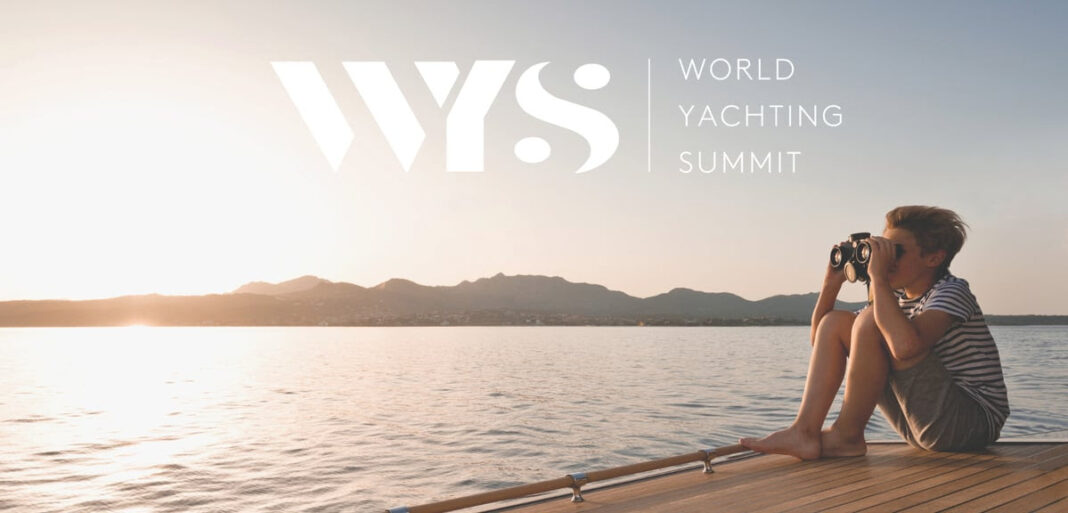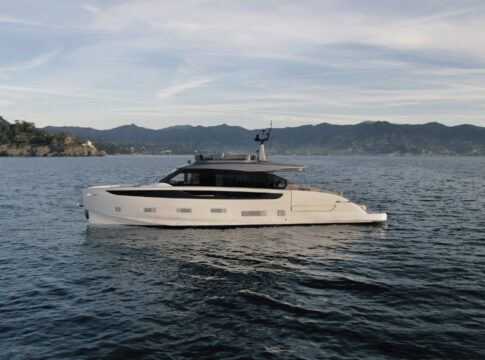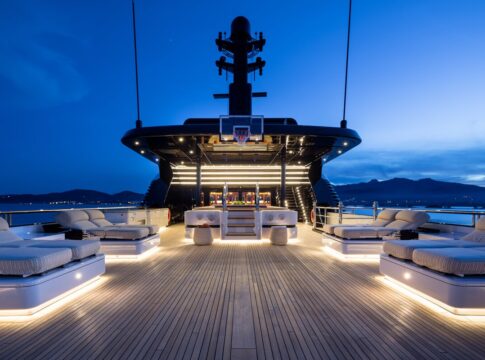Inspired by renowned global gatherings such as COP and Davos, the inaugural World Yachting Summit brought together a wide international yachting audience representing 20 nationalities.
Attendees included key players from the yachting industry, international organizations, regulatory bodies, and tourism authorities, alongside government officials, waterfront developers, and forward-thinking industry innovators.
The event fostered active dialogue, constructive debate, and excellent networking opportunities over the course of the three days the Summit lasted. Initial feedback from attendees and the marine media has been overwhelmingly positive. The event has successfully responded to the industry’s call for a more forward-looking approach, centered on a mix of innovation, sustainability and strategic vision.
The program featured 2 main tracks of 19 panel sessions over 3 days, addressing Business Perspectives & Tourism Development, as well as the industry’s challenges in creating a Practical Roadmap to Net Zero to Reinvent Yachting.
Participants also enjoyed 8 “Inspiration Talks” and expert keynotes, which provided valuable insights ahead of the workshops, along with perspectives from related industries such as luxury real estate, wealth management, luxury hospitality, watchmaking, and private aviation.
First. Unique. Different.
Mr. Jean-Claude Biver, one of the most famous worldwide leaders in horology, known especially for this many CEO tenures at the head of Blancpain and Hublot —two brands he resuscitated to great acclaim— gave the first of the “inspiration talks” on Tuesday 15th April. Mr. Biver emphasized the importance of staying connected to the future and listening to younger generations. Innovation, he said, comes from being first, unique, and different. He illustrated innovation through stories, like inventing a scratch-proof gold alloy and using carbon materials, and the fact that making mistakes allows to learn.
Review and Reinvent Yachting
In view of the growing criticism from the public and younger generations regarding its perceived lack of alignment with the UN’s 17 Sustainable Development Goals, the conclusions of the inaugural World Yacht Summit are that the yachting industry needs not only a true introspection but also tangible actions to improve its profile.
Following a keynote presentation on Wednesday 16th April by Giovanna Vitelli, Chairman of leading Italian shipyard Azimut Benetti, a wide range of industry stakeholders, including well-known figures such as Espen Oeino (EOI), Dan Lenard (Nuvolari-Lenard), Michael Breman (Lürssen) and Patrick Coote (MarineMax), delved into the many paths forward, which can be summarized through the SMART acronym played in a different way:
Sustainable: «Sustainability is no longer an option, we are definitely at a turning point in the human history and questioning the place of human beings on this planet. I think the future of humanity is at stake, not the future of the planet itself. » These very words by Mr Olivier Wenden, Vice-President and CEO of the Prince Albert II Foundation, who gave the participants an “inspiration talk” on Wednesday 16th April, were seconded by Barbara Sanches (DNV) during her keynote on whether the Road to Net-Zero is achievable. Even if yachting generally benefits from a lack of regulatory constraints, the industry must be ready to fail, to learn fast and evolve.
The path to net zero is not paved by one silver bullet, but by combining practical action today with strategic innovation for tomorrow —so as to position the yachting industry to transition from reactive compliance to proactive climate leadership, with stronger collaboration between all stakeholders. This was also the message conveyed by Energy Observer’s Founder & Captain Victorien Erussard when he narrated the adventure of his first laboratory vessel that circumnavigated the world without CO2 emissions.
Modern: One path to modernize the yachting industry, beside the adoption of new and efficient technologies and its digitization, lies in more transparency and shared information, from technical specifications to self-regulation —no more fake listings!
The industry can only benefit from following the example of other industrial sectors such as automotive and aviation, with the consumers, especially the younger ones, in need for clear understanding of who does what when business practices are no longer clearly delineated. The second path of modernization lies in the development of new yachting destinations, where relevant infrastructure and support services must combine with standardized regulations, while offering lifestyle propositions relevant to the new generations —of clients and crew too.
Attractive: Attracting younger generations requires simplifying processes, promoting the economic value of yachting and shifting the narrative from ostentation to purpose. This includes showcasing craftsmanship, building memories, and making boating feel accessible ideas strongly supported by university student attendees.
The industry needs to listen to the younger generations, understand their values and expectations, as the clients of tomorrow are becoming the clients of today. Their lifestyles are shifting. Yachting must adapt by offering more flexible, meaningful, and sustainable experiences.
Resourceful: There must be positive communication about yachting. Yachting is a vehicle for sharing wealth and creating economic value that benefits the broader community, especially middle and lower-income sectors.
Beyond lobbying yachting to the authorities who define the regulatory frameworks, under one single umbrella like with the EBAA (Europe) or NBAA (USA) in the private aviation sector, the industry must highlight its contributions as it invests in innovation, sustainability and long-term development. Continuous crew training is also essential, for skilled and engaged crew ensures safety, joy, and overall yacht value.
Transformative: Cultivating yachting culture begins with youth — and sailing. The industry must encourage early exposure to the sea and nature, so as to foster a deep connection with the marine environment. Introducing new people to the yachting industry should focus on passion, pride and commitment and excellence, with the standards of quality raised across all sectors in yacht building, management and operations.
A human-centric approach is key to combine technical excellence with emotional and experiential elements for lifestyle enrichment.
Cautious optimism
As explained by Mr Albert Manzone, Deputy COO of Société des Bains de Mer, the long-term renewed success of the Principality of Monaco comes from a combination of key factors such as political and fiscal stability —to foster investor confidence— connectivity and a diversified economy in a safe environment with multi-faceted lifestyles ; a recipe for resilience and reinvention worth exploring for emerging destinations as well as for the yachting industry.
The final session of the World Yachting Summit offered a reflective dialogue on the future of the industry, framed by “cautious optimism.” The discussion highlighted the sector’s reliance on global wealth, with past macroeconomic events like the dot-com bubble, the 2008 financial crisis, and the COVID-19 pandemic causing slowdowns followed by rebounds.
However, the current landscape presents more complex challenges, including geopolitical instability, regulatory pressures, and shifting client demographics. The next generation of yacht owners is more sustainability-focused, experience-driven, and less inclined to take on ownership complexities. A shortage of skilled crew and qualified tradespeople was also identified as a growing concern, with generational shifts in work attitudes affecting yacht operations and craftsmanship.
Discussions also touched on global shifts in wealth and infrastructure development, particularly in the Middle East, which is positioning itself as an alternative winter yachting destination. Yet, many emphasized that the cultural richness, history, and lifestyle of the Mediterranean remain unmatched for summer cruising.
Ultimately, while there is an undercurrent of concern about potential market contraction, the prevailing sentiment remained “cautiously optimistic” —anchored in the belief that with thoughtful adaptation, and a renewed focus on training, sustainability, and client-centric simplicity, the yachting industry can continue to thrive in a changing world.
However, as Mr. Bernard d’Alessandri, Secretary General of Yacht Club de Monaco, reminded all participants that “when we are at sea, we are guests in a world that is not our own”, a deeper sense of humility would probably also do the industry some good.
The success of the World Yachting Summit in Monaco was made possible through strategic partnerships with M3, a Monaco-based marina consultancy, and OMNIYAT, a leading luxury real estate developer headquartered in Dubai. “WYS 2025 leaves a lasting impression on the yachting industry,” says José Marco Casellini, CEO of M3.
“The Summit proved to be an extraordinary initiative on many levels, generating enthusiasm and praise from key industry players. Their positive feedback on both the quality of the content and the event’s organization highlights its great commercial potential. This gathering is set to establish itself as a driving force for innovation and strategic thinking about the future of yachting on a global scale.”






